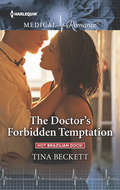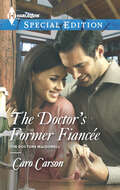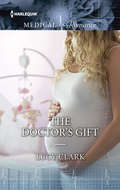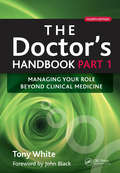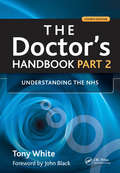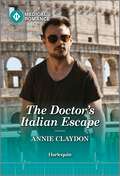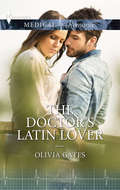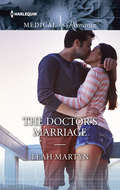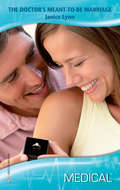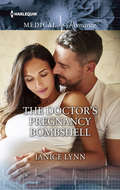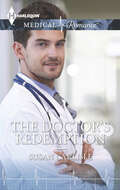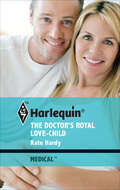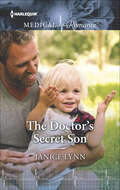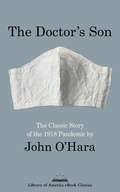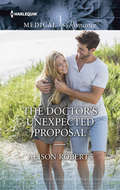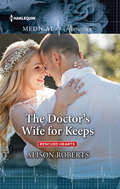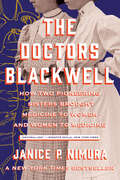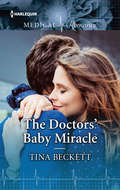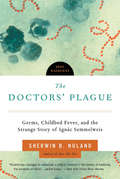- Table View
- List View
The Doctor's Forbidden Temptation
by Tina Beckett"Nata...we can't do this." To Dr. Adam Cordeiro, Natália Texeira has always been off-limits. As his best friend's sister, and a cancer survivor, he's felt a duty to protect her. But the doctor he meets on her first day at Santa Cora��o Hospital is all grown-up and far too tempting... Natália has always had a crush on Adam, but he has a playboy's reputation! Nevertheless, when their forbidden passion becomes irresistible, Natália is compelled to discover what's really holding Adam back from giving his heart...
The Doctor's Former Fiancee (The Doctors MacDowell #2)
by Caro CarsonWhen Braden MacDowell is reunited with Lana Donnoli, will their rivalry douse the last spark of their youthful infatuation-or ignite embers that never stopped smoldering? Don't miss this new installment of Caro Carson's miniseries, The Doctors MacDowell! She didn't want to imagine that the Braden MacDowell she had once loved could have turned so cold and calculating. But the billionaire CEO was taking away Dr. Lana Donnoli's funding. Just what was going on beneath her ex-fiancé's icy facade? And just what could she do to get him to change his stubborn mind? The last place Braden wanted to be was back in his family's hospital, close to the woman who had owned his heart. His business was all about the bottom line, a fact Lana just couldn't comprehend. But their passion for each other was still just as intense, still impossible to resist. Would those old feelings be enough to get them to a place where love was the best medicine?
The Doctor's Gift
by Lucy ClarkWhen red-headed locum Dr Kelly O'Shea roars into the small Australian village, Dr Matt Bentley's heart flips and their sizzling attraction culminates in one earth-shattering kiss. Kelly has to admit her secret - she's pregnant with her now ex-husband's child. Kelly retreats to sort out her life. Then Kelly realises she loves Matt, though there's only one way she can have him - she has to swallow her pride!
The Doctor's Handbook: Pt. 1 (Radcliffe Ser.)
by Tony WhiteMany doctors do not receive training early in their careers on the broad range of non-clinical aspects of their work, and confront day-to-day issues for which initial medical education has failed to prepare them. Experienced doctors and consultants can also experience a similar lack of accessible reference material on these aspects of their role and for the non-clinical training of their juniors. This book and its companion volume The Doctor's Handbook Part 2: understanding the NHS, have been written to address these and other needs. Previously published as The Specialist Registrar and New Consultant Handbook, these completely revised and reconfigured volumes reflect the changing everyday work of specialist trainees, registrars and consultants. Topics covered in Volume 1 include: *
The Doctor's Handbook: Pt. 2
by Tony WhiteMany doctors do not receive training early in their careers on the broad range of non-clinical aspects of their work, and confront day-to-day issues for which initial medical education has failed to prepare them. Experienced doctors and consultants can also experience a similar lack of accessible reference material on these aspects of their role and for the non-clinical training of their juniors. This book and its companion volume The Doctor's Handbook Part 1: managing your role beyond clinical medicine, have been written to address these and other needs. Previously published as The Specialist Registrar and New Consultant Handbook, these completely revised and reconfigured volumes reflect the changing everyday work of specialist trainees, registrars and consultants. Topics covered in Volume 2 include: *
The Doctor's Italian Escape (Jet Set Docs)
by Annie ClaydonIn this Jet Set Docs story by Annie Claydon, a trauma doc runs from a troubled past to Rome for a fresh start, with absolutely no time for romance…until the arrival of a beautiful new doctor! HIS BREATH OF FRESH AIR Four years ago, Dr. Joe outran the grief of losing his adoptive parents, his only rock in a troubled childhood, by escaping to stunning Rome. Between shifts as a trauma doc and running a free clinic for patients facing life-changing conditions, he has no time for romance—just how he likes it! Because love requires trust—not something Joe does easily! Until beautiful, wealthy Dr. Isabella volunteers at his clinic and challenges his preconceptions by saving the place. And suddenly Joe finds a connection he&’s never felt before…From Harlequin Medical: Life and love in the world of modern medicine. Jet Set Docs
The Doctor's Latin Lover
by Olivia Gates"You've made a mistake coming here. Now save us all a lot of hassle, and take the first flight home." The last time Dr. Javier Sandoval Noriega saw Savannah Richardson he asked her to marry him--and she laughed in his face. So what is the pampered socialite doing here, in Colombia, as part of Javier's Mobile surgery Unit? Can she really have become not just a top surgeon but a compassionate, committed doctor? And can Javier get rid of her fast--before he falls in love all over again?
The Doctor's Marriage
by Leah MartynComing soon! The Doctor's Marriage by Leah Martyn will be available Dec 15, 2016.
The Doctor's Marriage for a Month
by Annie O'NeilCould their temporary vows…Become a marriage for real?When Isla MacLeay comes to the beautiful Caribbean island of El Valderon, the last thing she expects is to be forced into marriage. But the fiery Scottish redhead is in danger, and the only solution is for her to wear Dr. Diego Vasquez’s ring. Isla is already nursing a broken heart…but now she must protect it from the man she could easily fall in love with—her husband!“Both the main characters were fascinating and I loved their back stories, as they’re so different, and yet, they’re so great together.”— Harlequin Junkie on One Night with Dr. Nikolaides“Annie O’Neil is a master of her craft when it comes to feeling what her characters feel and the whole mix together is what made me adore this story.”— Goodreads on Reunited with Her Parisian Surgeon
The Doctor's Meant-To-Be Marriage
by Janice LynnChelsea Majors met sexy Jared Floyd when they shared one fleeting but oh-so-memorable kiss ten years ago--the kiss that made her feel beautiful for the very first time. Now Dr. Majors has come to join Jared Floyd's practice, and discovers that although Dr. Floyd is just as smoldering as ever, there's a sadness in his eyes....Chelsea brings life and sparkle to the surgery--and everyone can see the smile start to return to Jared's chiseled face. As Chelsea and Jared gradually find their way back to one another, Jared begins to realize that this might be his last chance to make Chelsea his bride.
The Doctor's One Night to Remember: The Doctor's One Night To Remember / Reunited With Her Secret Prince (Mills And Boon Medical Ser.)
by Charlotte HawkesA night to rememberA man she’ll never forget!After her failed engagement, a relationship is the last thing on junior doctor Isla Sinclair’s mind. She’s focused on her forthcoming new life, working aboard a prestigious cruise ship. But before she even reaches the gangplank, she meets Nikhil… Their connection is unlike anything Isla has experienced before! But Nikhil is clear. One—unforgettable!—night is all he can offer…leaving Isla wholly unprepared for their unexpected reunion aboard ship!From Harlequin Medical: Life and love in the world of modern medicine.
The Doctor's Pregnancy Bombshell
by Janice LynnSurprise baby! Dr. Melissa Conner steeled herself to tell her partner, James--the man who'd always insisted he never wanted kids--that he was going to be a daddy! Only, E.R. consultant James Stanley dropped his own bombshell first. Unhappy with the way work had overtaken their relationship, he was leaving! And then he discovered Melissa's pregnancy. He knew that a baby would reopen painful scars from his past. But he still loved Melissa, and after the ultrasound scan he was surprised to find he loved his unborn baby, too. Could this tiny, growing life inside Melissa bring these two complex souls back together again? Yes, he hoped so.
The Doctor's Rebel Knight
by Melanie MilburneEmotionally and physically scarred, Dr. Frances Nin has come to Pelican Bay in search of tranquillity. But motorcycle-riding local rebel Sergeant Jacob Hawke gets her pulse rate spiking! One glimpse of the heat in Jacob's icy-blue eyes and Fran's fragile heart starts to bloom....Jacob knows that Fran questions her own medical ability, but the residents of Pelican Bay are in desperate need of a doctor, and she would be perfect. This gorgeous cop must convince Fran that it's not only the locals who want her to stay--he wants her by his side, to love, cherish and protect forever!
The Doctor's Redemption
by Susan CarlisleMardi Gras brings two people together in a celebration of hope and healing in this heartwarming novel from the author whose “books are like reading a hug” (Long and Short Reviews).Dr. Mark Clayborn never wanted to return to Alabama, but his father’s recent ill health has him back and facing his demons. Yet from the darkness shines a beacon of light: Laura Jo Akins—and he’s hoping she tastes as sweet as he imagines her to be.For so long Laura Jo’s only focus has been her daughter, but despite her reluctance, gorgeous Mark incites feelings she’d thought herself immune to . . . Could Laura Jo be the one to give Mark the courage to stay—and discover the love he deserves?“Susan Carlisle’s romances always have a strong emotional connection in them and this was no different . . . a journey of healing and loving again filled with emotions.” —Harlequin Junkie
The Doctor's Reunion to Remember (Reunited at St. Barnabas's Hospital #2)
by Annie ClaydonA forgotten past…An unforgettable future?In this Reunited at St. Barnabas&’s Hospital story, former workaholic Dr. Gil Alexander is happy with the slower-paced life he was forced to adopt following his traumatic brain injury. The only things missing are his memories of just before the accident. But when Dr. Clemmie Francis is temporarily assigned to his rehabilitation center, he can&’t shake the feeling he&’s met this captivating yet cautious doctor before…and that this isn&’t the first time he&’s experienced their explosive chemistry! Reunited at St. Barnabas&’s Hospital duetBook 1 – Twins for the Neurosurgeon by Louisa HeatonBook 2 – The Doctor&’s Reunion to Remember by Annie Claydon &“Would I recommend this book to others? In a New York minute. Or a Mediterranean hour. Annie Claydon gives every couple she creates the time and attention they deserve to come alive on the page.&”-Goodreads on Greek Island Fling to Forever &“A spellbinding contemporary medical romance that will keep readers riveted to the page, Festive Fling with Single Dad is a highly enjoyable treat from Annie Claydon&’s immensely talented pen.&”-Goodreads
The Doctor's Royal Love-Child (Brides of Penhally Bay #5)
by Kate HardyDedicated vet Melinda Fortesque has a secret.One she's kept from gorgeous doctor Dragan Lovak even though she's given him her heart. Now duty is calling her, and she knows she must tell him the truth about who she really is.It's enough of a shock for Dragan to learn that the woman he trusted and fell in love with is royalty! And that HRH Melinda has been called back to her country to take the throne. But now he's learned that she's carrying his child! How can be possible let her go?
The Doctor's Secret Son: Reforming The Playboy (Large Print Medical Romance Ser. #Vol. 897)
by Janice LynnThe truth about that night… Nurse Chrissie Tomberlain never thought she&’d see the unforgettable Dr. Trace Stevens, father of her little boy, again. She hadn&’t heard from him in four years, but then he shows up at a charity event and offers her another night of unbridled, no strings passion! Driven by his own demons, nomadic Trace has been saving lives in the world&’s most war torn places. He&’s never wanted to put down roots, but then beautiful Chrissie turns his whole life upside down with one incredible revelation he&’s a father!
The Doctor's Son: The Classic Story of the 1918 Pandemic
by John O'HaraSecrets emerge as a fearsome contagion in this long autobiographical story set in small-town Pennsylvania amid the influenza pandemic of 1918. “The Doctor’s Son” concerns James "Jimmy" Malloy, a teenager on the uncertain edge of manhood, confronted by sudden death and the loss of illusions. Having worked himself to exhaustion, his father, Doctor Mike Malloy enlists “Doctor” Myers, a medical student, to treat his patients until he has recovered and fifteen-year-old Jimmy drives Myers around the county on his rounds. O’Hara’s earliest account of his fraught relationship with his formidable father, this classic tale is, in the words of New York Times cultural critic Charles McGrath, "a love story, really, if a frustrated, unrequited one." It is also a fascinating record of the social effects of America's first great confrontation with a global pandemic.
The Doctor's Tender Secret
by Kate HardyEmotions are running high in the city hospital!On the hectic Pediatrics' ward of London City General, love just isn't running smoothly for Dr. Brad Hutton and Dr. Zoe Kennedy.They may have been instantly smitten with each other, but the secrets they have kept locked away make their future together uncertain.For Brad, the solution lies in putting his past behind him. But Zoe's secret goes a lot deeper, and to reveal it all she needs to find the courage to trust Brad completely. Only then can their powerful feelings win out….
The Doctor's Unexpected Proposal
by Alison RobertsDr Emily Morgan is giving up on love. She's been let down for the last time and she carries a secret that makes her wonder if she'll ever have a future - or a family. What she doesn't know is that Crocodile Creek's paramedic and helicopter pilot, her best friend Michael Poulos, has a secret of his own.
The Doctor's Wife for Keeps
by Alison RobertsSurgeon Luke Anderson let her go once…But this time around he’ll get down on one knee!Seeing pediatrician Kate Saunders again, Luke can feel the chemistry that still sizzles between them. But bruised from his failed marriage, he doesn’t believe in happy-ever-afters anymore. Until he’s reminded of the marriage pact they made in college…and realizes Kate may be the one woman who was worth waiting for!
The Doctors Blackwell: How Two Pioneering Sisters Brought Medicine To Women And Women To Medicine
by Janice P. NimuraOne of Apple's Most Anticipated Books of Winter 2021 "Janice P. Nimura has resurrected Elizabeth and Emily Blackwell in all their feisty, thrilling, trailblazing splendor." —Stacy Schiff Elizabeth Blackwell believed from an early age that she was destined for a mission beyond the scope of "ordinary" womanhood. Though the world at first recoiled at the notion of a woman studying medicine, her intelligence and intensity ultimately won her the acceptance of the male medical establishment. In 1849, she became the first woman in America to receive an M.D. She was soon joined in her iconic achievement by her younger sister, Emily, who was actually the more brilliant physician. Exploring the sisters’ allies, enemies, and enduring partnership, Janice P. Nimura presents a story of trial and triumph. Together, the Blackwells founded the New York Infirmary for Indigent Women and Children, the first hospital staffed entirely by women. Both sisters were tenacious and visionary, but their convictions did not always align with the emergence of women’s rights—or with each other. From Bristol, Paris, and Edinburgh to the rising cities of antebellum America, this richly researched new biography celebrates two complicated pioneers who exploded the limits of possibility for women in medicine. As Elizabeth herself predicted, "a hundred years hence, women will not be what they are now."
The Doctors' Baby Miracle: The Doctors' Baby Miracle / Resisting Her Commander Hero (rebels Of Port St. John's, Book 1000) (Mills And Boon Medical Ser.)
by Tina BeckettLosing a baby tore them apart…Can having another reunite them?Losing their daughter left doctors Tucker and Kady heartbroken and when he couldn’t face trying for another child, it left their marriage in pieces. When they meet again at a medical event, their memories are reawakened—along with their scorching chemistry! But Kady still longs for a baby, and Tucker must finally face his fears if he’s to find happiness with her again…
The Doctors' Christmas Reunion: The Doctors' Christmas Reunion / Unwrapping The Neurosurgeon's Heart (Mills And Boon Medical Ser.)
by Meredith WebberCan this husband and wife……be reunited for Christmas?Losing the baby they desperately wanted tore doctors Ellie and Andy Fraser’s marriage apart. Though they still share a home, they no longer share their lives. But when they find themselves caring for an abandoned baby, they must temporarily join forces, and as Christmas approaches, Ellie and Andy start to fall in love all over again. Is it time they created their own Christmas miracle?“Really, the way this story started drew me into the story immediately…the chemistry between this couple was strong and kept getting the stronger…."—Harlequin Junkie on A Wife for the Surgeon Sheikh“Overall, Ms. Webber has delivered a really good read in this book where…the chemistry between this couple was strong and had me loving their growing relationship, as…the romance was delightful….”—Harlequin Junkie on New Year Wedding for the Crown Prince
The Doctors' Plague: Germs, Childbed Fever, and the Strange Story of Ignac Semmelweis (Great Discoveries) (Great Discoveries #0)
by Sherwin B. Nuland"Riveting" (Houston Chronicle), "captivating" (Discover), and "compulsively readable" (San Francisco Chronicle). Surgeon, scholar, best-selling author, Sherwin B. Nuland tells the strange story of Ignác Semmelweis with urgency and the insight gained from his own studies and clinical experience. Ignác Semmelweis is remembered for the now-commonplace notion that doctors must wash their hands before examining patients. In mid-nineteenth-century Vienna, however, this was a subversive idea. With deaths from childbed fever exploding, Semmelweis discovered that doctors themselves were spreading the disease. While his simple reforms worked immediately--childbed fever in Vienna all but disappeared--they brought down upon Semmelweis the wrath of the establishment, and led to his tragic end.
